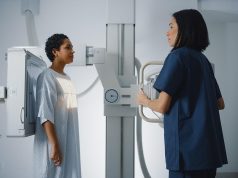Increased global efficiency, as well as decreased characteristic path length and altered nodal centralities, seen on functional MRI
By Elana Gotkine HealthDay Reporter
MONDAY, April 14, 2025 (HealthDay News) — For patients with breast cancer, the brain functional network shows a shift toward a more randomized pattern after neoadjuvant chemotherapy (NAC), with progression of chemotherapy leading to expanded abnormalities, according to a study published online April 9 in the Journal of Magnetic Resonance Imaging.
Jing Yang, from the Chongqing University Cancer Hospital in China, and colleagues examined changes in the brain connectome of patients with breast cancer at several time points during NAC in a longitudinal study. Fifty-five patients with breast cancer underwent clinical assessments and functional magnetic resonance imaging at baseline (TP1), the first cycle of NAC (TP2; 30 days later), and the end (TP3; 140 days later). The same assessments were also performed on two matched female healthy control groups (20 and 18 participants).
The researchers found that patients with breast cancer showed increased global efficiency post-NAC (TP2-TP1 = 0.087; TP3-TP1 = 0.078), decreased characteristic path length (TP2-TP1 = −0.413; TP3-TP1= −0.312), and altered nodal centralities mainly in the frontal-limbic system and cerebellar cortex. With chemotherapy progression, these abnormalities expanded significantly (TP2 versus TP3). There was also a correlation seen for topological parameter changes with clinical scale changes. There were no differences within or between healthy control groups or for breast cancer subgroups at TP1.
“The brain functional network in breast cancer patients after NAC showed a shift toward a more randomized pattern compared with that in breast cancer patients at baseline,” the authors write. “The observed pattern of functional network connectivity alterations can more sensitively capture abnormalities in cognitive function and emotional processing in breast cancer patients after NAC.”
Copyright © 2025 HealthDay. All rights reserved.








